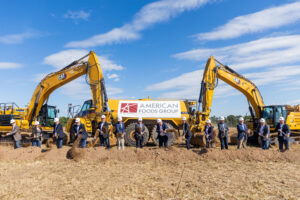Editor’s Note: Hasti Afsarifard is corporate innovation manager at Plug and Play Tech Center, the accelerator organization. Plug and Play runs programs across 11 different industries and was an early investor in DropBox, PayPal and Lending Club; all of which went on to become much coveted “unicorns”. In February, the organization launched its first Food & Beverage accelerator for startups innovating across Restaurants, Retailers, Distributors, Agriculture, Livestock, Manufacturing, and Food processing. Some of the technology focus areas for this program include Precision Agriculture, Ingredient Substitutes, Automation, Marketplaces, Inventory Management, Food Safety, and Water and Waste Management. Plug and Play is set to announce the first cohort in the coming days. Here Afsarifard writes about why the accelerator decided to focus on Food & Beverage and what it brings to the table.
The food value chain is confronted with major challenges around products, technology, and business models. Some of these challenges are being tackled head-on with thrilling new advancements, but these advancements present their own challenges.
Automation offers the reliability and consistency required for businesses to remain competitive in today’s globalized marketplace. There are a variety of applications for automation across the food value chain, from the farm to the factory, to the grocery store, to the kitchen. But low-skilled workers are decidedly against the concurrent rise in job loss. Robots are and will continue to replace many jobs that comprise of repetitive tasks. The management of these new tools requires specialized labor but will the trade-off be significant enough?
The combination of unpredictable weather and limited resources calls for new technologies that enable farmers to react faster and make more informed decisions. In order to maximize yield and profitability, farmers are seeking technologies that empower them with real-time decision making throughout the season, including planning, seeding, and harvesting. Food producers also strive to be more sustainable through environmentally-friendly packaging, efficiently utilizing inputs like water and fertilizers, and consciously managing runoff and waste.
Most consumers have been disconnected from where their food comes from and what ingredients are actually in their food. Shifts in consumer awareness are increasing the demand for minimally processed foods and transparency in the supply chain. This requires improvements in food production and distribution efficiency.
Acquisitions Aplenty in Food & Beverage
When corporations aim to acquire a larger market share in a specific category or enter an entirely new market, they often prefer to allow others to absorb the risks and acquire a brand that has already demonstrated product-market fit (i.e. achieving at least $10 million in annual sales). On average, food processors spend 0.8% of their revenue on R&D and beverage companies spend about 0.3%. For comparison, pharmaceutical companies spend up to 20%, and most tech companies will spend approximately 10%.
The Food and Beverage industry often seeks outside innovation when it comes to entering new markets. And proving this were over 600 acquisitions in this industry in 2016. The most active sectors were soft drinks with 74 acquisitions, packaging with 64, dairy with 58, and ingredients with 51. Alcoholic beverages also had highly active sections with 49 acquisitions in wine, 41 in spirits, and 37 in beer.
Food Corporations are recognizing the value of outside innovation to enhance their own engineering capabilities, increase market share, or enter entirely new markets. They are diversifying their portfolio companies to protect themselves from disruption; however, presence or even dominance in a variety of categories is not enough to prevent disruption. Established food conglomerates such as Tyson Foods, PepsiCo, and Danone have developed their own Corporate Venture Capital arms and are searching for solutions that address their biggest challenges.
Although many agribusiness leaders also have their own Corporate Venture Capital arms, the majority of their direct investments have been directed towards in-house R&D, with the goal of boosting their core-business. The results from a survey conducted by AgFunder and BCG Consulting last Fall indicated that agribusinesses are very interested in investing in outside innovation but do not feel prepared. There have been limited acquisitions in the agriculture sector, by contrast, to further along the food chain in the consumer products as detailed above.
The Plug and Play Way
Although corporations across the food supply chain are interested in investing in new technologies, they are also seeking lower risk wins. At Plug and Play, we love to see our corporate partners launching pilots with our startups, giving the startups a testbed for their ideas. In some cases, the corporation and the startup will work side-by-side on a co-development that compliments both of their core businesses and shows promising signs of a long-term partnership.
Here at Plug and Play, we take these corporate-startup pilots, co-developments, and investments as signals when we make our investment decisions. We have built the largest accelerator ecosystem in the world based on the idea that corporations and startups should be meeting one another on a regular basis and working with razor sharp focus on their synergies. And we realized that there was a genuine hunger for innovation in the food production, distribution, and consumption processes when working with some of our long-standing partners in our Retail, Internet of Things, and New Materials & Packaging programs. We, therefore, launched our food accelerator in February to mark our commitment to helping these business giants find entrepreneurs with the nimbleness and genius to truly shape the future of the industry.
Seena Amidi, founder and director of Plug and Play Food & Beverage program: “The world’s food source is facing its biggest challenge yet, and we know brilliant entrepreneurs are trying to solve this problem. I wanted to create a program that finds the best entrepreneurs and connects them to corporations that can expedite change.”
We reviewed over 1,000 startups operating across the supply chain and selected the top 100 to share with our corporate partners for review. Based on their feedback, we invited 30 startups to pitch at our Food & Beverage Selection Day to pitch executives from PepsiCo, Hershey’s, Ajinomoto, Molson Coors, and Panasonic.
Highlights from our Food & Beverage Selection Day
Recently, we accepted the top 16 startups that will participate in our 3-month acceleration program and look forward to announcing the startups after their orientation.





